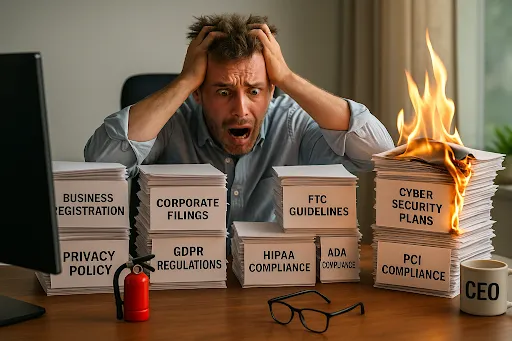Blogs
Blogs

You Don’t Buy Fire Insurance Hoping to Burn It All Down
How good people with great businesses lose everything because they never saw the warning signs
You don’t buy car insurance because you intend on crashing your car, and you don’t buy fire insurance hoping to watch your house go up in smoke, either.
You do it because deep down you know the worst-case scenario is always more expensive than the monthly premium.
So let’s talk about your business.
Because far too many good entrepreneurs build amazing things, only to see them wiped out; not by a bad idea, but by a bad assumption.
They assumed they were too small to worry.
They assumed no one was watching.
They assumed nothing bad would happen… until it did.
And the cost can be far more than just money. It’s far easier to recover money that it is to rebuild your Credibility. Trust. Reputation.
In fact, there’s a good chance your business is already exposed, and you don’t even know it.
The Wake-Up Call You Don’t Want to Get
In 2022, Anik Singal, CEO and founder of Lurn, a major online education company was blindsided when he was hit with a Civil Investigative Demand (CID) from the FTC.
He never thought something like this would happen to him. He thought he was safe because he had an AAA+ rating with the Better Business Bureau, glowing customer testimonials, and low chargebacks and refunds. From the outside, everything looked great. But inside?
The FTC accused the company of making unsubstantiated income claims, deceptive marketing practices, and more.
The result?
Over $2.5 million in fines
More than $15 million in total costs
A brand name permanently damaged in the eyes of regulators
And remember, he didn’t even think he was doing anything wrong.
You can read the actual FTC CID here: CID to Lurn, Inc.
The Most Dangerous Assumption You Can Make
“I’m too small to get in trouble.”
It’s the #1 belief that leads entrepreneurs straight into audits, lawsuits, and six-figure fines.
Because here’s the truth regulators don’t publicize:
They go after small businesses all the time because they’re easier to win against.
Why are businesses like yours targeted? Because. . .
You don’t have legal teams.
You don’t have PR firms.
You don’t have the budget to fight.
So you settle. Then you either pay or you fold.
And nobody writes an article about you in Forbes.
They just mark your case “closed” and move on to the next one.
The Real Mistakes That Destroy Small Businesses
You probably didn’t go into business dreaming of court dates and subpoenas.
But if you’re making even one of the mistakes below, you might already be putting your business and/or your assets in jeopardy.
1. Registering Your Business with Your Home Address
It seems harmless, right?
But when you use your home address on public business records:
You’re exposing your personal residence in any legal dispute
You risk personal liability if your protections are pierced
You make it easier for anyone to come after you directly. This could be a competitor, a regulator, or an angry customer.
Your home isn’t just where you live.
Don’t make it your legal battlefield.
2. Choosing the Wrong Business Structure
It’s all an alphabet soup. Do you create an LLC, S-Corp, C-Corp, Sole Proprietorship, Partnership? In the beginning it might not matter, but it will if you get sued.
Each has different implications for:
Taxes
Personal liability
Fundraising
Compliance burden
And choosing the wrong business structure (or skipping formation entirely) is like building a house without permits.
It looks good, until it collapses.
3. Copying Someone Else’s Privacy Policy
You see websites with a privacy link at the bottom. Sometimes you click on it and nothing happens. Other times, you find a clean one, so you think all you need to do is tweak the name and paste it into your site.
Done, right?
Wrong.
Privacy laws like GDPR, CCPA, and Canada’s PIPEDA require:
Specific disclosures
Tracking behavior
Consent protocols
Data processing rights
And they apply based on where your customers reside, not you.
Not only that, but privacy laws are changing all the time. The likelihood is that any privacy policy last updated in a year prior to the current year is already out-of-date. It’s another tell-tale sign that your business is a great target for fines by regulators.
In 2023, U.S. companies paid more than $1.6 billion in penalties for data privacy violations.
~ Privacy Affairs GDPR Tracker
While Privacy Policies are ever changing, they aren’t the only requirement you need to have posted if you do any business online. You also may need to have easily accessible policies such as Terms of Service, Refund Policy, Shipping Policy, Cookie Policy, DSAR, Impressum, Disclaimer, Acceptable Use Policy and a EULA.
Don’t just go to your local lawyer for assistance. There are cloud-based services that are far more affordable that the hourly rates of a lawyer, and unless your lawyer specializes in international privacy laws, the likelihood is they aren’t even up to speed on what’s necessary.
4. Thinking Accessibility Doesn’t Apply to You
In recent years, lawyers have been trolling retail locations just looking for opportunities to sue businesses that weren’t accessible to people with disabilities. Today, this has morphed into now looking to see if your website isn’t usable by everyone including those who have dyslexia, are visually impaired or have other disabilities.
If your site doesn’t offer accessibility features such as screen readers, alt tags, contrast ratios, keyboard navigation, etc., you’re likely violating ADA compliance in the U.S. or one of the other applicable international laws include the United Nations Convention on the Rights of Persons with Disabilities (CRPD), the European Accessibility Act (EAA), and various national laws such as the UK Equality Act of 2010, the Canadian Accessible Canada Act, and the Australian Disability Discrimination Act of 1992.
In 2023, there were 4,605 ADA lawsuits related to inaccessible websites.
~ UsableNet ADA Report 2024
Most of the claims were filed against small businesses.
It used to be that accessibility was just best practice, but now it’s legally required.
5. Running Without a License (Because You Work from Home)
You’re virtual, remote, lean. You don’t have all the added expenses of renting office space or having to pay another set of utility bills.
But are you compliant?
Local laws still require:
Business licenses
Home occupation permits
Sales tax registration
Zoning compliance
One complaint from a neighbor, or a random audit, and you could be fined thousands.
25% of fines issued in 2023 were to home-based businesses operating without proper documentation.
~ U.S. Chamber of Commerce SMB Report
6. Thinking “Cybersecurity” Only Means Having a Strong Password
Let’s break this down:
You use Google Drive
You store client info
You have email automations
You collect payments online
You’re a data handler now.
60% of small businesses go out of business within 6 months of a cyber attack.
~ IBM Cost of a Data Breach Report 2023
All it takes is:
A stolen password
An unencrypted file
One click on a bad link
You’d be surprised how many entrepreneurs think cybersecurity begins and ends with a “clever” password like H@ppyBiz2023!
(Yes, we’ve seen worse.) According to Security.org, 24% of Americans still use dangerously weak passwords like “123456,” “password,” “qwerty,” or even “iloveyou.” And a 2023 Cybernews study confirmed “123456” remains the most common password in the world.
Real cybersecurity, applicable even for solopreneurs on a laptop at the kitchen table, is about far more than password creativity. It’s about protecting everything that touches your business online.
Let’s break it down. At the bare minimum, cybersecurity includes:
Firewall protection for your device and home Wi-Fi (yes, your home router needs to be locked down)
Antivirus and anti-malware software running in real-time
Automatic updates for your operating system, browser, and business apps (outdated software = open doors)
Password management tools (not sticky notes, spreadsheets or the password program built into browsers)
Multi-factor authentication (MFA) for every tool you use: email, bank, website, CRM , everything.
Encrypted backups stored securely off-device or in the cloud
Secure document storage especially if you collect customer data, health info, or payment details
Access control to devices meaning no one else should be using your business computer or phone – period
Here’s the real truth:
If your business relies on digital devices to operate, then you are a cybersecurity risk.
Think you’re too small to be targeted?
You’re exactly the kind of low-hanging fruit cybercriminals love. According to Verizon’s 2023 Data Breach Investigations Report, over 43% of cyberattacks target small businesses because they assume you haven’t locked the doors. In fact, 65% of businesses that suffer from a data breach are typically out of business in under 6 months.
Now that regulatory agencies are also using AI to scan the web for vulnerabilities, it’s not just hackers you should worry about. It’s also the digital watchdogs with subpoena power.
You don’t have to be perfect, but you do have to be prepared.
➡️ Take the simple steps now to protect your data, your clients, and your reputation—before someone else finds the holes for you.
AI Can Now Find You Before You Even Know You’re Vulnerable
You might think, “Nobody’s looking at my little business.”
But regulators have leveled up.
The FTC, state attorneys general, and other enforcement bodies now use AI crawlers to:
Scan websites for missing disclosures
Track claims in ads and webinars
Detect unlicensed entities in government databases
Monitor social media for deceptive testimonials
They don’t need someone to report you.
Software finds the violation.
Then a human sends the subpoena.
What Happens When You Get Caught?
Let’s say you get a CID like Anik Singal. Here’s what’s next:
Legal fees: $200–$500/hour
Staff hours: 200–500+ to collect docs
Brand reputation: Crushed
Trust from customers? Gone
Compliance fix + fines: $10,000–$2M+
Even if you “didn’t mean it.”
Even if you have great testimonials.
Even if you never had a refund issue.
How to Protect Yourself (Before It’s Too Late)
1. Know What You Don’t Know
Assuming you’re exempt is the first step to being exposed.
Instead: Get clarity.
2. Treat Compliance Like Insurance
You don’t need everything today—but you need a roadmap to stay protected.
3. Book a Discovery Call With Experts Who’ve Seen It All
Let us walk you through your risks, your blind spots, and your path forward.
This isn’t about fear—it’s about freedom.
👉 Schedule your free compliance discovery call now
(Before your inbox contains something with “Federal Trade Commission” in the subject line.)

The success stories and results displayed on this website serve as examples of our past work and capabilities. While we strive to deliver exceptional outcomes for all our clients, we cannot guarantee specific results, as individual circumstances and performance can vary. By using our services, you acknowledge that results may differ, and no guarantees are provided.
